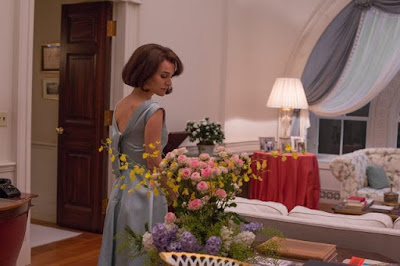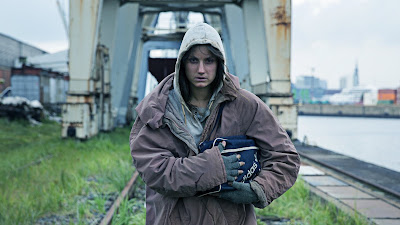Coming on the heels of one of the year's worst documentaries, purportedly on the same subject but shockingly pretentious, empty and stupid (Kate Plays Christine), the amazing narrative version of the story of Florida TV personality, Christine Chubbuck -- titled simply Christine and directed by Antonio Campos, from a screenplay by Craig Shilowich, starring the great Rebecca Hall (above and below) in her finest performance yet -- works almost perfectly on every level, from simple and effective storytelling to its depiction of a vanished time and place (Sarasota, Florida, in the 1970s). Ms Hall's uncanny performance is the best by an actor, male or female, that I have seen all year (for several years, actually, perhaps during this entire new millennium). Best of all, the film explores its subject from many angles, finally doing real justice and honor to a difficult personality, her life and career. This is a model movie in every way, one against which all further bio-pic narratives will need to be judged. (You can read my complete review of the film by clicking here.)
Below, in alphabetical order, are the rest of my "bests" for 2016 -- (click on each title link if you want to read my earlier coverage of that movie) -- which proved another great year for foreign films, independents and documentaries, despite its leaving us (illegally, I suspect, via vote tampering and voter suppression) with the worst. most egregious sleazebag possible as President of the United States.
As usual, my list is long. There were simply too many excellent movies to have to limit the list to ten. Certain films (Gods of Egypt) found themselves here due as much to their utter and inappropriate rejection by critics and audiences, greatly influenced, one suspects, by all the pre-judging via internet. Others (Beautiful Something) were such a resounding surprise that they managed to move outside their specific genre, while yet others (The Love Witch, and Sam Klemke's Time Machine) were so unique, bizarre and riveting that they create their own genre.
So, even as we move onward and downward, socially and politically, we may also move upward, so far as films are concerned -- if the following 52 titles are any indication....
AFERIM! Romania's entry into the BFLF Oscar sweeps was overlooked by the Academy, but it's a better movie than the winning film, Son of Saul. (Aferim! didn't cover the WWII Holocaust, so of course it couldn't compete.) Radu Jude's bleak but comedic look at history and the persecution of gypsies is like little you'll have previously seen.
APRIL AND THE EXTRAORDINARY WORLD Gorgeous, inventively old-fashioned animation coupled to an entrancing tale. Kids and adults should simultaneously go gaga.
ART BASTARD The art industry eviscerated via one artist's nifty little story and career. A must-see.
BEAUTIFUL SOMETHING The gay film of the year: as artful and empathetic as it is dreamlike and sexual.
BEING 17 The latest and one of the best from André Téchiné explores the relationship of two high school boys in the French provinces.
THE BRAND NEW TESTAMENT Gloriously funny satire targeting religion, modern society and lots more in this Belgian bonanza all about god's backstory.
BY SIDNEY LUMET A wonderful and riveting appreciation of one of Hollywood's great, undersung directors -- done mostly via his own words and accompanying pix.
CAPTAIN FANTASTIC The family film of the year -- all about how to "teach your children well," along with the intended and unintended results of same.
COLLIDING DREAMS One of the best and most thought-provoking documentaries about Israel, its history and place in the today's world.
THE CORPSE OF ANNA FRITZ The year's most transgressive movie doubles as a nifty little thriller that's sharp, fast and -- yikes! -- feminist!
DE PALMA Another first-rate doc about a moviemaker (see By Sidney Lumet, above) in which the moviemakers and that director cover just about his entire oeuvre.
EISENSTEIN IN GUANAJUATO Peter Greenaway explores Eisenstein and his sexuality in a movie that's as capacious, gorgeous and full of temptation as our hero's Mexican lover's cock.
EMBRACE OF THE SERPENT The third world as seldom (if ever) seen in this black-and-white marvel about the meanings and results of colonization.
FATIMA The French choice for Best Film of the Year is simplicity itself, while working beautifully on just about every level.
FIREWORKS WEDNESDAY Another of Asghar Farhadi's older Iranian movies, only this year finally getting a theatrical release. As good as, if not better, than his others.
GERMANS & JEWS This "discussion" documentary is a bracing, must-see addition to the continuing history of both Germany and Jews.
GODS OF EGYPT Yep. Not simply "better-than-you've-heard," but the closest thing to a modern-day Thief of Bagdad that has yet appeared. Delightful, crazy fun.
GREEN ROOM The year's best, fastest, tightest thriller, and yet another reason to mourn the untimely passing of that wonderful young actor, Anton Yelchin.
THE HANDMAIDEN A knockout melding of sex, story and style from South Korea's Park Chan-wook. The most visually gorgeous movie of this beauty-packed year.
HELL OR HIGH WATER This modern western, as good as the genre gets, also offers up the way we live now to a sad, desolate "t."
HOMO SAPIENS Photography as plot, character and theme in Nikolaus Geyrhalter's ode to the beauty to be found in desolation.
I, DANIEL BLAKE Ken Loach has lost none of his ability to move and anger us at the plight of the unnecessarily downtrodden.
I KNEW HER WELL The best film ever made about a woman, this practically unknown but great, humane and encompassing Italian movie from 1965 only this year saw its at-last! theatrical and home-video release on these shores.
INDIGNATION James Schamus' first directorial effort doubles as the best Philip Roth on film so far. A beautiful, sorrowful period piece.
THE INNOCENTS Anne Fontaine's best is also one of the year's deepest and most profound tales of faith and caring.
THE KIND WORDS From Israel, a family film about siblings, parenting and parentage that will charm and surprise you.
LAMB Ross Partridge's tale of caring, trust and betrayal is so unusual that, even if you're not as smitten as TM was, I suspect you won't be able to deny the power of this strange and moving fable.
LONDON ROAD The year's best -- and most original -- musical, this knockout will only seem better once the home video version is released, with English subtitles, we hope, so that we can really savor all those great "lyrics."
LOOK WHO'S BACK I believe that the only place you can see this provocative German comedy that concerns the "return" of Hitler (and no, its not about Donald Trump) is via Netflix streaming. This is one brave, smart, hilarious experience.
LOST AND BEAUTIFUL A documentary about so many things -- Italy, labor, animals, history and more -- that come together as a glorious, mystifying whole.
LOVE & FRIENDSHIP Maybe the best Jane Austen adaptation so far. Whit Stillman and Kate Beckinsale excel -- and then some.
THE LOVE WITCH This one-of-a-kind movie has stayed with me longer and more firmly that I would have imagined. Hence its inclusion here. (A number of other critics were impressed, as well, so try it.)
MIA MADRE From Italy, an exquisite little film about mothers and movie-making that surprises and enchants.
MANCHESTER BY THE SEA Kenneth Lonergan's look at how we live with guilt is is a profound experience (also lively, humorous and angry) not to be missed
MARGUERITE The French version of Florence Foster Jenkins is by far the better movie. Rich, beautiful, mysterious, moving and funny.
MOONLIGHT Personal filmmaking raised to a very high level of accessible art, this tale of growing up black and gay in the Miami area is as rich and resonant as movies come.
MY BIG NIGHT The year's best, most energetic and lively comedy -- so fast, furious and filled with incident and characters that you'll have to work hard to keep up. It is more than worth the effort.
NOT FILM All about Samuel Beckett, his Film, his being, and his work (and so much else, especially filmmaking itself). This one-of-a-kind documentary should prove catnip even to those who are not Beckett fans.
NUTS! Penny Lane's delightful doc about an American of a century past who may remind you of a certain Mr. Trump.
ONCE IN A LIFETIME Based on real events, this French movie about teaching, learning and the Holocaust is marvelous and moving in both the lessons imparted and how these are executed.
RABIN: THE LAST DAY Amos Gitai's important and provocative look at Israeli history, with emphasis on the life and death of Yitzhak Rabin.
SAM KLEMKE'S TIME MACHINE An original and then some, this modest-but-amazing documentary about one very ordinary fellow and his attempt to capture his own life and times is made quite special via the intelligence brought to it by the filmmaker, Matthew Bate.
THE SIMILARS Low-budget sci-fi/fantasy doesn't get any better -- or more fun -- than this little treasure from Mexico's Isaac Ezban.
SING STREET John Carney hits three-for-three in his latest film demonstrating how music can change and better your life.
SERIAL KILLER 1 A disturbing, provocative French film about the search for and meaning of justice -- for criminal and victims alike.
STARVING THE BEAST An important documentary all about the current and seemingly lasting assault on public higher education.
TALE OF TALES Matteo Garrone's wonderful dark fairy tale explores some of the work of a famous Italian fabulist. Rich, playful, inventive and gorgeous.
THEO WHO LIVED This amazing doc about a journalist who actually survived his terrorist kidnapping is told by the victim himself and is all the more riveting and thoughtful for this telling.
THE THOUGHTS THAT ONCE WE HAD Thom Andersen's latest doc about movies and life and history and what connects it all is as personal and pleasurable as you'd expect from his past work.
VITA ACTIVA: THE SPIRIT OF HANNAH ARENDT The best of any of the films involving the great Ms Arendt that we've so far seen, this doc explores the writer's ideas and connects them to her -- and our -- lives.
WEINER-DOG Todd Solondz's latest look at our dark side filled with humor and hypocrisy to the max.
THE WITNESS Kitty Genovese finally gets her due in this fine documentary that turns her -- at last -- into something so much more than mere victim.
























































